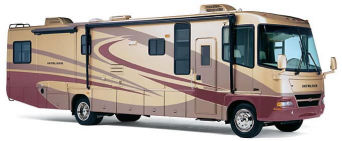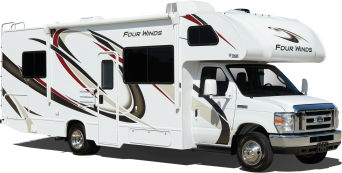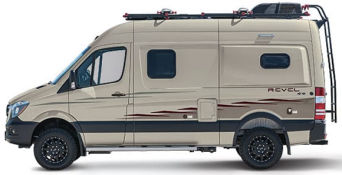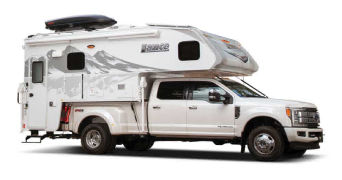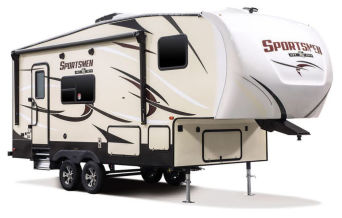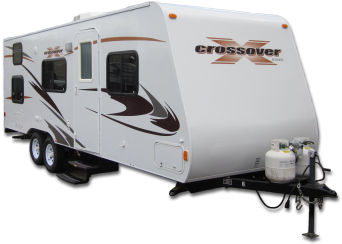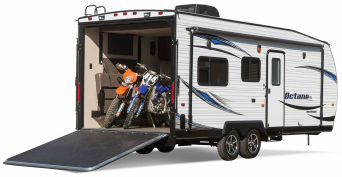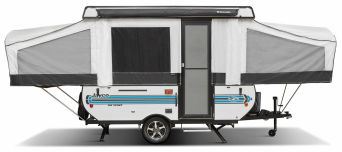Driving a motor home opens up a new world of on-the-road travel adventure. It requires no special license, and it's easier than many newcomers think. Experienced automobile drivers already have the skills to drive a motorized RV. Automatic transmissions, power brakes and power steering are typical features. Your motor home vacation can be the experience of a lifetime. These guidelines can help make it a safe one too.
GENERAL RV DRIVING TIPS
Adjust and use all rear view mirrors. As in any new vehicle, before leaving on a trip, sit in the drivers seat and adjust all mirrors for optimal road views.
Be aware that the driver sits higher in a motor home. This is a distinct advantage because you can see farther and react more quickly.
Allow more time and space for an RV. It takes significantly longer for these bigger vehicles to accelerate, slow down and stop. Therefore, do not follow too closely in traffic, and allow more time to brake, change lanes and enter busy highways.
Be aware that the driver is farther to the left of the center of the vehicle. This causes most drivers to drive too far to the right side of the road. Be aware of this and make the necessary adjustments.
Minimum height clearance is 11 feet in a motor home. Be on alert to avoid hitting overhanging tree branches, carport roofs and low canopies over filling stations, motels, etc. Finding out the exact height of the RV you're driving is best.
Due to the length of the motor home, its turning radius is greater. The front and rear wheels will track paths much farther apart than those of a car. Also, when driving from a flat surface up an incline or vice versa, the rear end will drag. Though the motor home is built to handle most of these types of situations with the built-in drag skids, driving very slowly will minimize the possibility of any damage. Very steep inclines should be avoided as damage may occur for which you will be held responsible.
Be aware that a motor home is buffeted by cross winds and air currents created by passing trucks. Slow down your driving speed when big trucks pass. Anticipate the wind effects and compensate for them.
When backing up the vehicle use the mirrors and have someone watch out the back window. In close quarters, have someone give directions from outside, while you view things through a side mirror. If another person is not available, the driver should get out and inspect the area behind the vehicle. By evaluating the situation before backing up, drivers can avoid surprises and accidents.
RV DRIVING IN THE MOUNTAINS
Watch the engine temperature carefully. If the engine overheats, immediately pull off the right side of the road for the engine to cool. Check the engine for coolant. Use low gear on inclines where the transmission is repeatedly upshifting and downshifting. The proper way to descend is to put the transmission in low gear, thus avoiding the overuse of the brakes. If at any time it appears that the brakes are fading, the vehicle should immediately be stopped and the brakes allowed to cool before proceeding.
RV DRIVING ON GRAVEL ROADS
Motor homes operate reasonably well on dirt and gravel roads. However, on such roads, gravel thrown up by oncoming traffic can produce dents in the fiberglass or windshield damage.
RV DRIVING ON SLIPPERY ROADS
Motor homes are actually better at negotiating slippery road conditions than are automobiles. The fact that a higher percentage of the weight of the coach is on the rear wheels means that the traction will be good. However, slow down and exercise caution when you encounter slippery conditions. Traction may be better due to weight, but if you start to slide, that same extra weight will carry you further than a car.
RV DRIVING ON BACK COUNTRY ROADS
Motor homes are not suited for traveling on really rough roads. These roads frequently wind through woods that have not been cleared sufficiently to permit the huge bulk of a motor home to pass. Also, due to the height of a motor home, any unevenness in the road, especially side-to-side unevenness, may result in a constant throwing about of all items stored in the upper part of the coach and the possible tipping over of the vehicle.
RV DRIVING ON THE HIGHWAYS
Frequently, long lines of cars collect behind a motor home. When this happens, the driver should pull off the road to let the cars go by. If you do not do this, particularly daring drivers will take dangerous risks to get by, and the motor home will be the focal point of a potential accident.
RV DRIVING IN WINDY CONDITIONS
Motor homes, by their very nature, are high profile vehicles. Like all such vehicles they are adversely affected by windy conditions. If the wind is blowing, your best bet is to slow down. Speed and wind make for very dangerous situations. Turn on the radio and check for wind advisories. If the situations are dangerous (or you see other high profile vehicles such as large trucks or other motor homes pulled over to the side), pull over and wait for the wind subside.
RV DRIVING IN FREEZING WEATHER
When the temperature drops, driving conditions change. In addition to making roads icy (including the hard to see "black ice"), cold weather may cause freezing of the vehicle. If the temperature drops below freezing, the operations guide gives specific actions to take to prevent damage to the vehicle systems. If you have any questions, please call.
RV DRIVING SAFETY
When you're driving a motor home, make every trip a safer one by buckling up your safety belt and making sure passengers are also secure. Wearing a safety belt is the single most effective thing you can do to prevent serious injury and death in a traffic accident, according to the national safety Belt Coalition. Besides, it's the LAW.
With proper attention to the differences in vehicle size, height and weight you'll find it fun and easy to take the wheel of a motor home. A motor home is not difficult to drive, however it is substantially wider, longer and heavier than an automobile. These differences do call for special driving procedures. The procedures are easy to master and make your trip that much more enjoyable.





